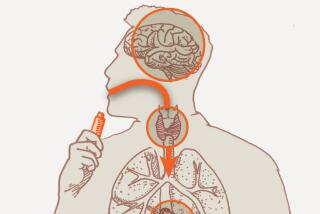Carnivorous plants’ diets may be a danger
- Share via
Carnivorous plants have been on the decline in the Southeastern United States for decades, plagued both by poachers and human development. Now scientists say they could face another threat -- food poisoning from the insects they eat.
Researchers from Bournemouth University in England tested whether the swamp-dwelling pitcher plant Sarracenia leucophylla would be affected if the bugs it ate contained high levels of trace metals.
After letting maggots feast on dog food laced with copper or cadmium, the researchers fed the maggots to the plants. They found that those that had eaten maggots full of copper were largely unharmed, and those devouring cadmium-filled larvae showed smaller, less-healthy shoots.
Because copper is a metal that the plant needs in certain amounts, the researchers theorized that it had systems to regulate copper intake. But because cadmium is generally toxic, the plant was unable to limit the amount it absorbed, according to authors of the study, which was published in February in the journal Environmental Science and Technology.
Bob Ziemer of the Carnivorous Plant Newsletter praised the study, but pointed out that for many meat-eating plants in the Southeastern U.S., the disappearance of 90% of their habitat over the last century is the most pressing threat.
More to Read
Sign up for Essential California
The most important California stories and recommendations in your inbox every morning.
You may occasionally receive promotional content from the Los Angeles Times.













